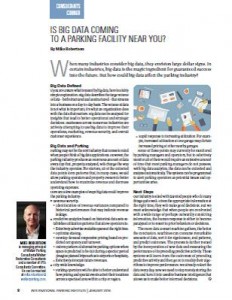When many industries consider big data, they envision large dollar signs. In certain industries, big data is the magic ingredient for guaranteed success into the future. But how could big data affect the parking industry?
Big Data Defined
If you are unsure what is meant by big data, here is a fairly simple explanation: Big data describes the large volume of data—both structured and unstructured—that streams into a business on a day-to-day basis. The volume of data is not what is important; it’s what an organization does with the data that matters. Big data can be analyzed for insights that lead to better operational and strategic decisions. Businesses across numerous industries are actively attempting to use big data to improve their operations, marketing, revenue security, and overall customer experience.
Big Data and Parking
Parking may not be the first industry that comes to mind when people think of big data applications. However, the parking industry produces an enormous amount of data every day that, properly analyzed, will change the way the industry operates. For starters, all of the collected data points form patterns that, in many cases, would allow parking operators and property owners to better understand how to maximize revenue and decrease operating expenses.
Here are a few examples of ways big data could improve the parking industry:
Revenue security:
- Identification of revenue variances compared to historical performance that may indicate revenue leakage.
- Predictive analytics based on historical data sets establishes utilization patterns that allow operators to:
- Effectively advertise available spaces at the right time.
- Optimize staffing.
- Develop demand-responsive pricing based on predicted occupancy and turnover.
- Inform parkers of alternative parking options when space is predicted to be full during a specific period (imagine planned trips such as to airports or hospitals).
- Effectively forecast future revenues.
City-wide knowledge:
- Parking operators will be able to better understand how pricing and special events affect their locations across a specified area within a city or region.
- Rapid response to increasing utilization. For example, increased utilization at one garage may dictate increased pricing at other nearby garages.
Some of these points may currently be monitored by parking managers and operators, but to effectively monitor all of them would require an extensive amount of time that most parking managers do not possess. With big data analytics, the data can be collected and analyzed automatically. The systems can be programmed to alert parking operators as potential issues and opportunities arise.
Next Steps
Our industry is filled with talented people who do many things quite well. Given the appropriate information at the right time, they will make good decisions. But we must acknowledge that when people are confronted with a wide range of perhaps outwardly conflicting information, the human response is either to become paralyzed or to resort to prior behaviors or decisions.
The more data a smart machine gathers, the better the conclusion. Machines can consume remarkable amounts of data, sort it for significance, find patterns, and predict outcomes. The process is further refined by the incorporation of new data and measuring the performance of its preceding predictive activity. These systems will learn from the outcomes of preceding predictive activity and then go on to modify their algorithms to improve performance. We already collect the data every day; now we need to stop merely storing the data and turn it into useable business intelligence that allows us to make better informed decisions.

